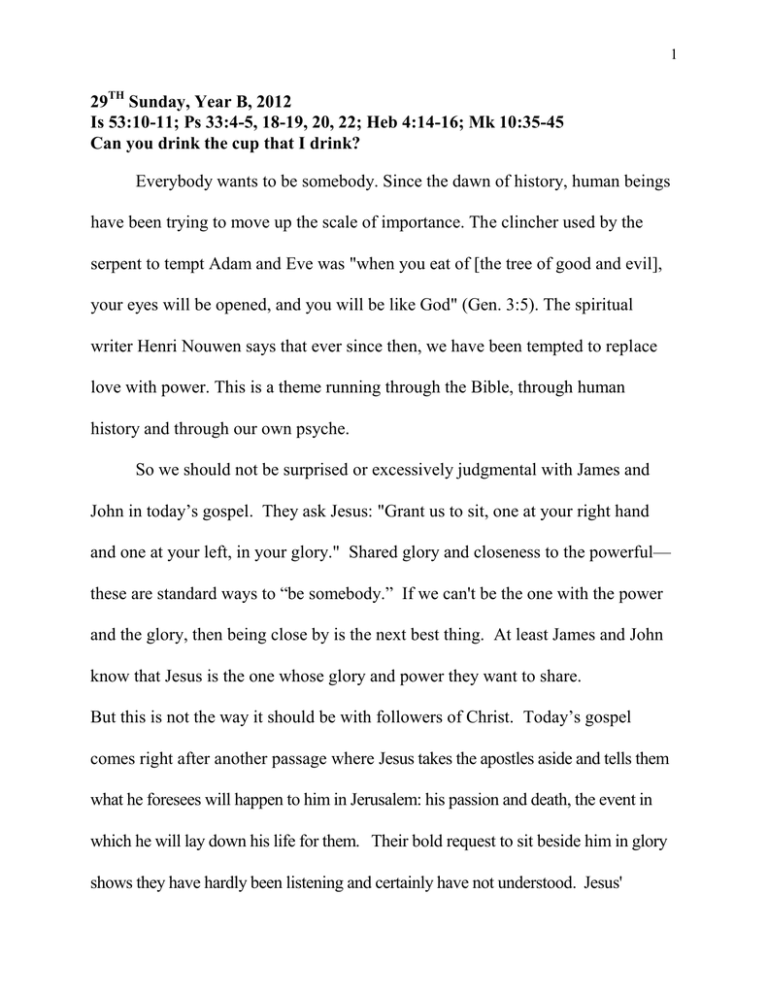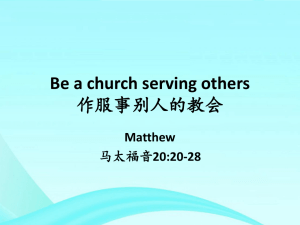29 Sunday, Year B, 2012
advertisement

1 29TH Sunday, Year B, 2012 Is 53:10-11; Ps 33:4-5, 18-19, 20, 22; Heb 4:14-16; Mk 10:35-45 Can you drink the cup that I drink? Everybody wants to be somebody. Since the dawn of history, human beings have been trying to move up the scale of importance. The clincher used by the serpent to tempt Adam and Eve was "when you eat of [the tree of good and evil], your eyes will be opened, and you will be like God" (Gen. 3:5). The spiritual writer Henri Nouwen says that ever since then, we have been tempted to replace love with power. This is a theme running through the Bible, through human history and through our own psyche. So we should not be surprised or excessively judgmental with James and John in today’s gospel. They ask Jesus: "Grant us to sit, one at your right hand and one at your left, in your glory." Shared glory and closeness to the powerful— these are standard ways to “be somebody.” If we can't be the one with the power and the glory, then being close by is the next best thing. At least James and John know that Jesus is the one whose glory and power they want to share. But this is not the way it should be with followers of Christ. Today’s gospel comes right after another passage where Jesus takes the apostles aside and tells them what he foresees will happen to him in Jerusalem: his passion and death, the event in which he will lay down his life for them. Their bold request to sit beside him in glory shows they have hardly been listening and certainly have not understood. Jesus' 2 response to James and John challenges their assumptions about greatness and prominence: "Are you able to drink the cup that I drink, or be baptized with the baptism that I am baptized with?" In the Psalms and prophets of the Old Testament, the "cup" one drinks often refers to the fate that lies ahead of a person. "Baptism" does not refer to the Christian sacrament, but is a standard biblical metaphor for undergoing trials and dangers that are seen as a passage through stormy, turbulent waters. When Jesus tells James and John he will drink the cup that will be offered to him in Jerusalem, he is telling them that because of his great love for them he is ready to accept even death for them. When he tells them that giving out places in his Kingdom belongs not to himself but to the Father, he is pointing to his radical trust in God, not in his own power. Drinking this cup he faces calls for surrendering his future entirely into the hands of the God, trusting totally in the faithfulness and generosity of God. Those who wish to be his associates must accompany him in this trust as well. When James and John say they are ready to drink this cup with Jesus, without fully realizing what they are letting themselves in for, they express readiness to share Jesus' fate and to share his trust in God. Jesus accepts their declaration and affirms that it will come to be. James did share Jesus’ cup in a literal way when he died a martyr. The cup from which Jesus drank is self-emptying love, the giving of his own life for others. The baptism with which he was baptized is a burial of the old world with its power games. It turns our idea of greatness upside down. "Whoever wishes to become 3 great among you must be your servant, and whoever wishes to be first among you must be a slave of all. For the Son of Man came not to be served but to serve, and to give his life as a ransom for many." True greatness is not at the pinnacle of the pyramid of power. For Jesus, the way to greatness moves in the opposite direction. It is downward mobility. It is not the way of upward mobility in which we often invest so much of our energy, but the way downward ending with self-surrender on the cross. True leadership is not power and control, but loving service, humility, and ultimately trust that not we but God is finally in charge of what is happening. Day by day, it calls for us to make ourselves ready to show caring service to others in their needs. In extraordinary circumstances it might even call for us to make really major sacrifices for them. But always it invites us to trust our entire selves to God—our hopes and hesitations, our doubts and our faith, our fear and our courage. Can we drink this cup? Doing so will call for genuine faith that God will be with us, just as God was with Jesus when he drank the cup of his fate on the cross in Jerusalem. Let’s pray for that faith together around the table to which Jesus invites us when he says: “Take this, all of you, and drink from it. For this is the cup of my blood which will be poured out for you.” The cup we share at this table will sustain us even when the way we travel becomes like road Jesus travelled to Jerusalem. David Hollenbach, S.J., St. Ignatius Church October 21, 2012









